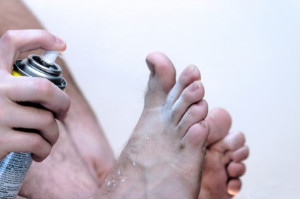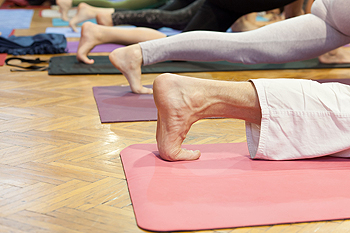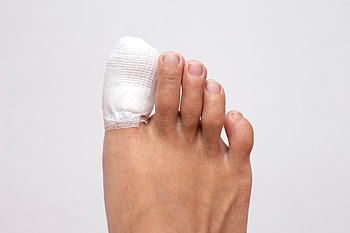Connect With Us
Blog
Items filtered by date: April 2019
Common Places Where Athlete's Foot Is Spread
 Athlete’s foot is a fungal infection of the skin, often causing severe itching and discomfort. Many people are affected between the toes or on the bottom of the feet and wearing shoes and socks for the majority of the day can be uncomfortable. The infection generally appears to be a red rash, and blisters may form in severe cases. This fungus will typically enter the body through tiny cracks in the skin, and it is known to be contagious. It thrives in places that are warm and moist, and these often include community pools, shower room floors, and surrounding areas. It is beneficial to wear appropriate shoes while in these types of environments, which may be helpful in the prevention of this condition. If you have developed Athlete’s foot, it is suggested that you seek the counsel of a podiatrist who can guide you toward proper treatment techniques.
Athlete’s foot is a fungal infection of the skin, often causing severe itching and discomfort. Many people are affected between the toes or on the bottom of the feet and wearing shoes and socks for the majority of the day can be uncomfortable. The infection generally appears to be a red rash, and blisters may form in severe cases. This fungus will typically enter the body through tiny cracks in the skin, and it is known to be contagious. It thrives in places that are warm and moist, and these often include community pools, shower room floors, and surrounding areas. It is beneficial to wear appropriate shoes while in these types of environments, which may be helpful in the prevention of this condition. If you have developed Athlete’s foot, it is suggested that you seek the counsel of a podiatrist who can guide you toward proper treatment techniques.
Athlete’s Foot
Athlete’s foot is often an uncomfortable condition to experience. Thankfully, podiatrists specialize in treating athlete’s foot and offer the best treatment options. If you have any questions about athlete’s foot, consult with Scott Matthews, DPM, MD from Salem Foot Care . Our doctor will assess your condition and provide you with quality treatment.
What Is Athlete’s Foot?
Tinea pedis, more commonly known as athlete’s foot, is a non-serious and common fungal infection of the foot. Athlete’s foot is contagious and can be contracted by touching someone who has it or infected surfaces. The most common places contaminated by it are public showers, locker rooms, and swimming pools. Once contracted, it grows on feet that are left inside moist, dark, and warm shoes and socks.
Prevention
The most effective ways to prevent athlete’s foot include:
- Thoroughly washing and drying feet
- Avoid going barefoot in locker rooms and public showers
- Using shower shoes in public showers
- Wearing socks that allow the feet to breathe
- Changing socks and shoes frequently if you sweat a lot
Symptoms
Athlete’s foot initially occurs as a rash between the toes. However, if left undiagnosed, it can spread to the sides and bottom of the feet, toenails, and if touched by hand, the hands themselves. Symptoms include:
- Redness
- Burning
- Itching
- Scaly and peeling skin
Diagnosis and Treatment
Diagnosis is quick and easy. Skin samples will be taken and either viewed under a microscope or sent to a lab for testing. Sometimes, a podiatrist can diagnose it based on simply looking at it. Once confirmed, treatment options include oral and topical antifungal medications.
If you have any questions, please feel free to contact our office located in Wikesboro, NC . We offer the newest diagnostic and treatment technologies for all your foot care needs.
Toe Curls and Yoga for the Toe
 Research has indicated it is easier to run when the feet are healthy. Stretching the feet frequently will help the feet to become strong and may positively affect the overall health of the body. When proper foot stretches are performed, the feet become stable, and running extended distances may be easier to achieve. There are several exercises that are designed to strengthen the feet. When toe curling is practiced, the entire foot becomes stronger, and can be done while standing or sitting down. An effective stretch for the toes is referred to as toe yoga. This is accomplished by moving the toes one at a time and will help in keeping the top of the foot strong. If you would like additional information about the benefits of stretching the feet, it is advised that you speak to a podiatrist who can provide you with the correct knowledge.
Research has indicated it is easier to run when the feet are healthy. Stretching the feet frequently will help the feet to become strong and may positively affect the overall health of the body. When proper foot stretches are performed, the feet become stable, and running extended distances may be easier to achieve. There are several exercises that are designed to strengthen the feet. When toe curling is practiced, the entire foot becomes stronger, and can be done while standing or sitting down. An effective stretch for the toes is referred to as toe yoga. This is accomplished by moving the toes one at a time and will help in keeping the top of the foot strong. If you would like additional information about the benefits of stretching the feet, it is advised that you speak to a podiatrist who can provide you with the correct knowledge.
Stretching the feet is a great way to prevent injuries. If you have any concerns with your feet consult with Scott Matthews, DPM, MD from Salem Foot Care . Our doctor will assess your condition and provide you with quality foot and ankle treatment.
Stretching the Feet
Stretching the muscles in the foot is an important part in any physical activity. Feet that are tight can lead to less flexibility and make you more prone to injury. One of the most common forms of foot pain, plantar fasciitis, can be stretched out to help ease the pain. Stretching can not only ease pain from plantar fasciitis but also prevent it as well. However, it is important to see a podiatrist first if stretching is right for you. Podiatrists can also recommend other ways to stretch your feet. Once you know whether stretching is right for you, here are some excellent stretches you can do.
- Using a foam roller or any cylindrical object (a water bottle or soda can will do), roll the object under your foot back and forth. You should also exert pressure on the object. Be sure to do this to both feet for a minute. Do this exercise three times each.
- Similar to the previous one, take a ball, such as a tennis ball, and roll it under your foot while seated and exert pressure on it.
- Grab a resistance band or towel and take a seat. If you are using a towel, fold it length wise. Next put either one between the ball of your foot and heel and pull with both hands on each side towards you. Hold this for 15 seconds and then switch feet. Do this three times for each foot.
- Finally hold your big toe while crossing one leg over the other. Pull the toe towards you and hold for 15 seconds. Once again do this three times per foot.
It is best to go easy when first stretching your foot and work your way up. If your foot starts hurting, stop exercising and ice and rest the foot. It is advised to then see a podiatrist for help.
If you have any questions, please feel free to contact our office located in Wikesboro, NC . We offer the newest diagnostic and treatment technologies for all your foot care needs.
Do You Wanna Be a Podiatrist?
 People who are interested in helping folks who have foot and ankle disorders may want to consider podiatry as a career choice. Some of the conditions that are treated may be ingrown toenails, chronic foot pain, or bunions, which may require surgery for permanent relief. Additionally, podiatrists may specialize in diabetic foot care, and can prescribe custom-made orthotics. The schooling that is required in most states is a four year post graduate program followed by three years of residency training. If you would like to pursue a career in podiatric medicine, speak with a podiatrist who can answer any questions you may have.
People who are interested in helping folks who have foot and ankle disorders may want to consider podiatry as a career choice. Some of the conditions that are treated may be ingrown toenails, chronic foot pain, or bunions, which may require surgery for permanent relief. Additionally, podiatrists may specialize in diabetic foot care, and can prescribe custom-made orthotics. The schooling that is required in most states is a four year post graduate program followed by three years of residency training. If you would like to pursue a career in podiatric medicine, speak with a podiatrist who can answer any questions you may have.
If you are dealing with pain in your feet and ankles, you may want to seek help from a podiatrist. Feel free to contact Scott Matthews, DPM, MD from Salem Foot Care . Our doctor can provide the care you need to keep you pain-free and on your feet.
What Is a Podiatrist?
A podiatrist is a doctor of podiatric medicine who diagnoses and treats conditions of the foot, ankle, and related structures of the leg. Your podiatrist may specialize in a certain field such as sports medicine, wound care, pediatrics, and diabetic care. Podiatrists have the ability to become board certified through training, clinical experience, and then taking an exam.
What Do Podiatrists Do?
On a daily basis, a podiatrist may perform the following activities:
- Diagnose foot ailments such as ulcers, tumors, fractures, etc.
- Use innovative methods to treat conditions
- Use corrective orthotics, casts, and strappings to correct deformities
- Correct walking patterns and balance
- Provide individual consultations to patients
It is very important that you take care of your feet. It’s easy to take having healthy feet for granted, however foot problems tend to be among the most common health conditions. Podiatrists can help diagnose and treat a variety of feet related conditions, so it is crucial that you visit one if you need assistance.
If you have any questions please feel free to contact our office located in Wikesboro, NC . We offer the newest diagnostic and treatment technologies for all your foot and ankle needs.
Possible Treatment of a Broken Toe
 The bones that exist in the toes are fragile and small, and may easily break if a heavy object is dropped on them. Patients may realize their toe may be broken if it appears to be crooked, or if an open wound occurs after the injury happens. Additional symptoms may include pain, difficulty in moving the toe, and swelling. Mild relief may be found while elevating the foot, which may help to decrease swelling. It is suggested to keep the foot as still as possible, and this may be accomplished by resting the foot frequently during the day. Taping the injured toe to the toe next to it may provide stability while the healing process occurs. If you feel you have broken your toe, it is suggested that you consult with a podiatrist who can properly diagnosis and treat this condition.
The bones that exist in the toes are fragile and small, and may easily break if a heavy object is dropped on them. Patients may realize their toe may be broken if it appears to be crooked, or if an open wound occurs after the injury happens. Additional symptoms may include pain, difficulty in moving the toe, and swelling. Mild relief may be found while elevating the foot, which may help to decrease swelling. It is suggested to keep the foot as still as possible, and this may be accomplished by resting the foot frequently during the day. Taping the injured toe to the toe next to it may provide stability while the healing process occurs. If you feel you have broken your toe, it is suggested that you consult with a podiatrist who can properly diagnosis and treat this condition.
A broken toe can be very painful and lead to complications if not properly fixed. If you have any concerns about your feet, contact Scott Matthews, DPM, MD from Salem Foot Care . Our doctor will treat your foot and ankle needs.
What to Know About a Broken Toe
Although most people try to avoid foot trauma such as banging, stubbing, or dropping heavy objects on their feet, the unfortunate fact is that it is a common occurrence. Given the fact that toes are positioned in front of the feet, they typically sustain the brunt of such trauma. When trauma occurs to a toe, the result can be a painful break (fracture).
Symptoms of a Broken Toe
- Throbbing pain
- Swelling
- Bruising on the skin and toenail
- The inability to move the toe
- Toe appears crooked or disfigured
- Tingling or numbness in the toe
Generally, it is best to stay off of the injured toe with the affected foot elevated.
Severe toe fractures may be treated with a splint, cast, and in some cases, minor surgery. Due to its position and the pressure it endures with daily activity, future complications can occur if the big toe is not properly treated.
If you have any questions please feel free to contact our office located in Wikesboro, NC . We offer the newest diagnostic and treatment technologies for all your foot and ankle needs.
What Causes Hammertoe?
 If you notice your middle toes are bent in a downward position, you may have what is referred to as hammertoe. The second toe is typically affected, and it may resemble a hammer as a result of the way it is bent. The most common reasons for hammertoes to develop may be from wearing footwear that does not fit correctly. These may include shoes which do not have ample room for the toes to move freely in. Additional reasons why this condition may develop may be genetic factors, or existing medical conditions which may include bunions or arthritis. Many people experience common symptoms when hammertoe has developed. These may include toe pain when the toes are stretched downward, toes that are curled, or thickened skin on the affected toe and surrounding areas. Hammertoes may be prevented by wearing shoes that fit correctly, and this often means choosing shoes that have adequate room for the toes to move about in. If you have this ailment, please consult with a podiatrist who can discuss proper treatment options with you.
If you notice your middle toes are bent in a downward position, you may have what is referred to as hammertoe. The second toe is typically affected, and it may resemble a hammer as a result of the way it is bent. The most common reasons for hammertoes to develop may be from wearing footwear that does not fit correctly. These may include shoes which do not have ample room for the toes to move freely in. Additional reasons why this condition may develop may be genetic factors, or existing medical conditions which may include bunions or arthritis. Many people experience common symptoms when hammertoe has developed. These may include toe pain when the toes are stretched downward, toes that are curled, or thickened skin on the affected toe and surrounding areas. Hammertoes may be prevented by wearing shoes that fit correctly, and this often means choosing shoes that have adequate room for the toes to move about in. If you have this ailment, please consult with a podiatrist who can discuss proper treatment options with you.
Hammertoe
Hammertoes can be a painful condition to live with. For more information, contact Scott Matthews, DPM, MD from Salem Foot Care . Our doctor will answer any of your foot- and ankle-related questions.
Hammertoe is a foot deformity that affects the joints of the second, third, fourth, or fifth toes of your feet. It is a painful foot condition in which these toes curl and arch up, which can often lead to pain when wearing footwear.
Symptoms
- Pain in the affected toes
- Development of corns or calluses due to friction
- Inflammation
- Redness
- Contracture of the toes
Causes
Genetics – People who are genetically predisposed to hammertoe are often more susceptible
Arthritis – Because arthritis affects the joints in your toes, further deformities stemming from arthritis can occur
Trauma – Direct trauma to the toes could potentially lead to hammertoe
Ill-fitting shoes – Undue pressure on the front of the toes from ill-fitting shoes can potentially lead to the development of hammertoe
Treatment
Orthotics – Custom made inserts can be used to help relieve pressure placed on the toes and therefore relieve some of the pain associated with it
Medications – Oral medications such as anti-inflammatories or NSAIDs could be used to treat the pain and inflammation hammertoes causes. Injections of corticosteroids are also sometimes used
Surgery – In more severe cases where the hammertoes have become more rigid, foot surgery is a potential option
If you have any questions please contact our office located in Wikesboro, NC . We offer the newest diagnostic and treatment technologies for all your foot and ankle needs.
Blog Archives
- March 2025
- February 2025
- January 2025
- December 2024
- November 2024
- October 2024
- September 2024
- August 2024
- July 2024
- June 2024
- May 2024
- April 2024
- March 2024
- February 2024
- January 2024
- December 2023
- November 2023
- October 2023
- September 2023
- August 2023
- July 2023
- June 2023
- May 2023
- April 2023
- March 2023
- February 2023
- January 2023
- December 2022
- November 2022
- October 2022
- September 2022
- August 2022
- July 2022
- June 2022
- May 2022
- April 2022
- March 2022
- February 2022
- January 2022
- December 2021
- November 2021
- October 2021
- September 2021
- August 2021
- July 2021
- June 2021
- May 2021
- April 2021
- March 2021
- February 2021
- January 2021
- December 2020
- November 2020
- October 2020
- September 2020
- August 2020
- July 2020
- June 2020
- May 2020
- April 2020
- March 2020
- February 2020
- January 2020
- December 2019
- November 2019
- October 2019
- September 2019
- August 2019
- July 2019
- June 2019
- May 2019
- April 2019
- March 2019
- February 2019
- January 2019
- December 2018
- November 2018
- October 2018
- September 2018
- August 2018
- July 2018
- June 2018
- May 2018


